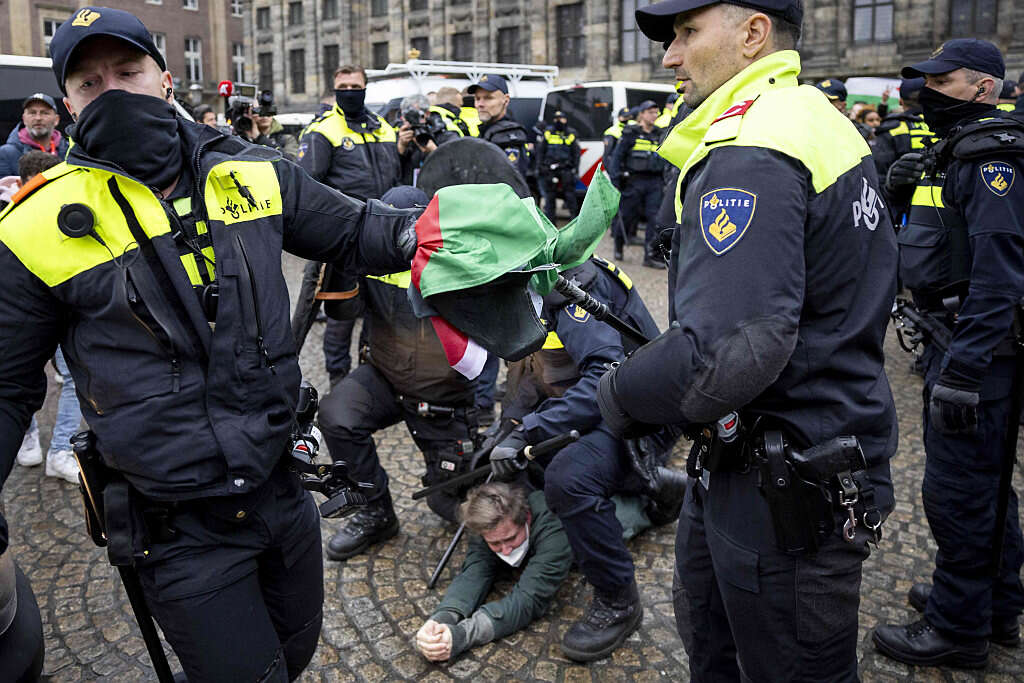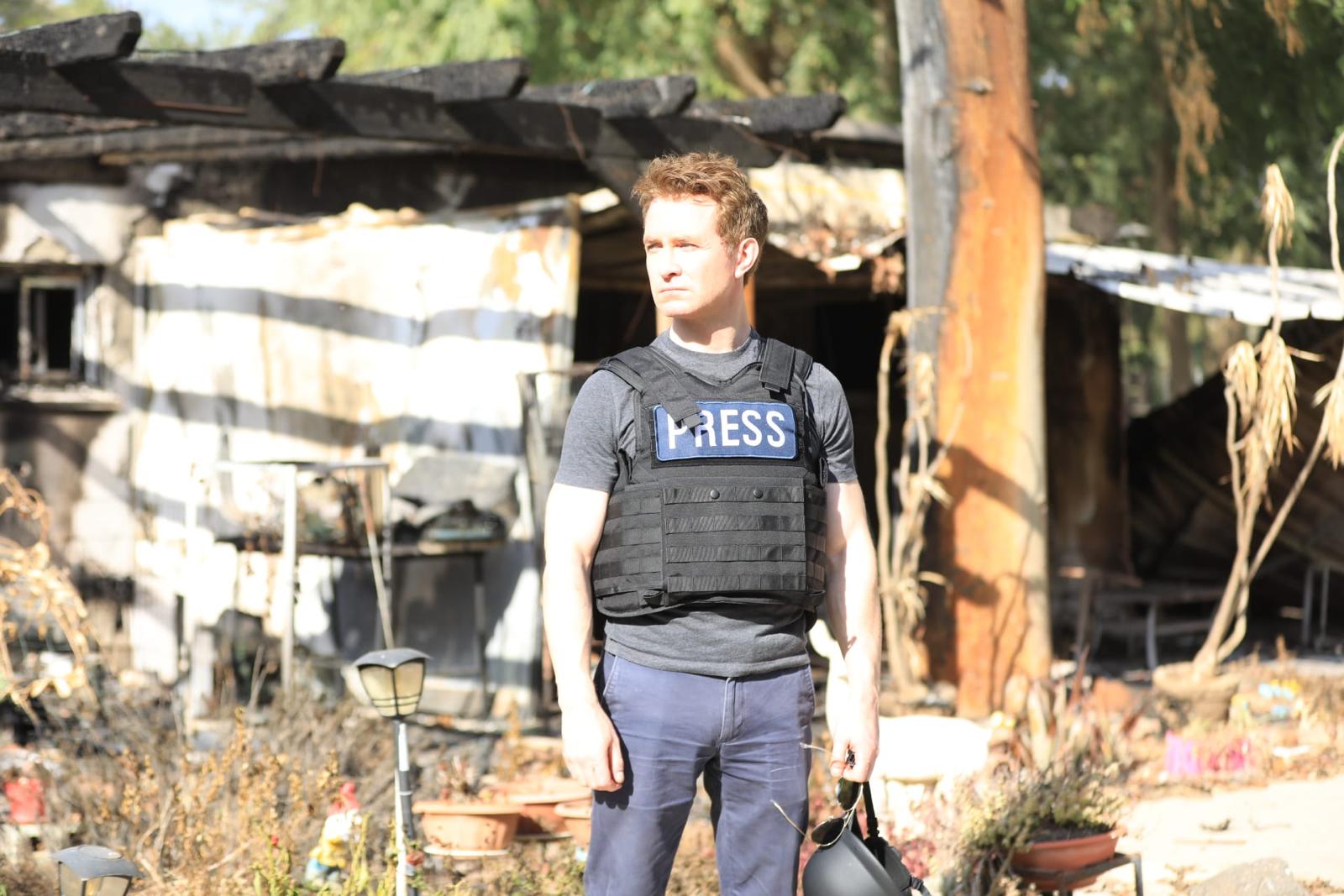Douglas Murray says 'many in Europe want to throw Israel to the crocodiles'
During his numerous visits to the country, both on the home front and battlefield, he has seen Hamas and Hezbollah terror bases with his own eyes, witnessed the bravery of soldiers, and observed the facts that anti-Israeli media and diplomacy persistently try to hide and distort – but unlike in the past, he says, the old establishments no longer have a monopoly on knowledge.
Ariel Bulshtein
Israel Hayom
Dec 1, 2024
Douglas Murray at Kibbutz Nir Oz, Nov. 2023.
Since October 7, Israelis have come to appreciate and love Douglas Murray. The British author, editor, and journalist, whose name was previously known mainly to conservative thinkers among the people of Zion, has become a frequent visitor to our region over the past year. When not here, Murray "bombards" the global media: responding to false claims, shattering blood libels, defending our righteousness, and exposing the nakedness of those who seek to portray Israel – which is fighting for its existence – as the source of troubles and problems.
This year, Murray has also gotten to know us and fallen in love, especially with IDF soldiers. Despite his British reserve, evident in all his conduct, he cannot hide his sympathy and admiration for the uniformed members of the Israel Defense Forces. "It's the soldiers," he responds when asked which Israeli inspires him the most. "I am repeatedly amazed to see them, 18 and 19-year-olds, defending their people with courage and sacrifice in exceptional circumstances. I'll share one example: a friend of mine, with whom I entered Lebanon during the past month, is a sniper who lost an arm in battle inside Gaza. Despite the injury, he insisted on returning to service and fighting. I admire people like him."
Murray has entered Lebanon with IDF forces several times and seen up close Hezbollah's preparations to attack northern Israeli communities. He's clear that what happened in the communities near Gaza could have befallen the Galilee, only with far more horrifying intensity. "Hezbollah's tunnels so close to the border were the most terrifying thing I've seen," Murray recalls. "I stood at one of Hezbollah's compounds, looked toward the Israeli cities and villages, which I know well, and thought how fortunate it was that Israel managed to prevent such an attack. We'll see what happens following the ceasefire taking effect, but it's clear that the terrible danger of a massacre in the north was prevented."

Although he prefers not to enter Israeli political disputes, Murray has a clear insight into another danger – the danger of division and extremism. "Sometimes an outsider sees certain things in Israeli society and thinks that only those with a death wish could do such things," he diagnoses sadly. "I wonder how those Israelis who threatened refusal during the judicial reform discussions feel now. These are the kinds of things that truly break society. When in August 2023, IDF commanders had to declare that despite the refusal, units would maintain operational readiness, this was music to the ears of Israel's enemies. Without criticizing any particular segment of Israeli society, we must reiterate the importance of preserving what's shared in society, certainly when facing a common enemy."
"But after October 7, this society proved its ability to live together, unite against a common enemy, and overcome. That's encouraging. Politics, of course, always brings back the divisions. But I hope Israeli society will remember the lessons of the past year. Sometimes, people tend to go crazy over things that aren't really that important, certainly compared to bigger issues. Emotions run high, discourse intensity increases, and people make threats they don't necessarily mean. This isn't unique to Israel – look at what happened recently in America. Media outlets and even Democratic candidates called Donald Trump 'Hitler,' a 'fascist and tyrant,' saying 'his victory would end democracy.' And now these same people are knocking on his door begging for interviews, which says several things about them. One is that they never meant what they said. I expect them to reflect and learn to restrain themselves. Something similar happens in all democratic countries, including Israeli society."
Unlike the US, in Israel, the left's hatred toward Netanyahu and the right hasn't diminished with their rise to power and has taken the form of attempting to prevent them from implementing right-wing policies.
"That's indeed the big issue here, and within it, there's a phenomenon of external intervention to prevent policy implementation, not just in war management, in all areas. It's crazy and reaches absurdity. It was quite amusing, to put it mildly, to see American administration officials during the judicial reform discussions criticizing Israel for the idea of moving to political appointment of judges. When the American administration criticizes another democratic country's internal policy, that's strange in itself, but to criticize it for aspiring to adopt the American model? In America, there's nothing more political than Supreme Court appointments. Much of the external criticism of Israel isn't just unfounded in facts; it's simply hypocritical. And regarding what's happening inside Israel, there's no doubt that regulating powers between government branches is a major challenge."
Murray has written plays, biographies, and non-political books, but gained fame through his ideas and no less through his brilliant ability to clothe them in sharp, precise formulations – both written and spoken. His published books have become international bestsellers, and the subsequent series of public lectures have drawn audiences of thousands.
In 2017, Murray published "The Strange Death of Europe: Immigration, Identity, Islam," which remained on the Sunday Times bestseller list for 20 weeks, even reaching the top spot. Since then, the book has been translated into dozens of languages. Murray argued in the book that Europe is committing suicide by allowing culturally hostile foreign immigration into its territory and losing its "faith in its religion." In days when Europe's ruling elite, led by German Chancellor Angela Merkel, pursued an open-door policy flooding Western Europe's wealthy nations with millions of Muslims from the Middle East, Murray's statements were seen as subversive. Instead of engaging with them, the left – true to form – rushed to label him an Islamophobe, dismissing him outright as an extremist and presenting his concerns about the West's fate in the face of Europe's quiet conquest by Muslims as paranoia.
Seven years later, even Murray's critics would find it hard to deny the new European reality, which proves daily that Merkel and her ilk were wrong, and he was right all along. If, in 2017, critics still dared to mock the "apocalyptic picture" of future Europe in Murray's book, this picture is no longer confined to the book's pages. It has taken over Amsterdam's alleys, established itself in Paris's squares, and doesn't skip the streets of Berlin, Brussels, or London. The apocalypse has arrived, and anyone who still doesn't notice its presence is invited to walk through European cities' Muslim neighborhoods wearing a visible Star of David or cross.


Police officers clash with protestors during a demonstration on Dam Square on November 10, 2024
In 2022, Murray published another fascinating book – "The War on the West: How to Prevail in the Age of Unreason," published in Hebrew by Shibolet. He lamented the murky wave of self-hatred that swept the West and sought to warn that only evil regimes and dictatorships worldwide would benefit from it. Murray showed how after the West overcame external enemies, its greatest enemies in recent decades developed precisely within its own elite ranks, and how a reality emerged where anyone trying to stand against them is immediately blackened and silenced by pseudo-intellectual terror. If the West wants to survive, he concluded, it must win the battle forced upon it: point out the hypocrisy and denial in anti-Western arguments and redevelop self-confidence in the civilization that brought the message of freedom and justice to the world.
In September this year, Murray embarked on a lecture tour across the United States to share with the American public what happened in Israel on October 7. The responses were enthusiastic. Many in the audience said their eyes were opened following Murray's description. Now, he's bringing the concept to Tel Aviv, but in a slightly different form. "In the meetings to be held at the Tel Aviv Culture Hall on December 4 (at 18:00 and 21:00), I'll try to strengthen, encourage, and uplift the spirit," Murray explains. "It's important that Israel keeps its head high. After October 7, Israelis were in shock, mourning, and also despair. During the months since then, this has reversed. I feel that Israelis from all parts of society have again raised their heads proudly following the successes, achieved largely thanks to the country's political leadership.
The arrest warrants issued against Netanyahu and Gallant sharpen the choice: will democratic nations be able to defend themselves, or will we be dependent on the mercies of international bodies? The European leaders who declare they will enforce the warrants are simply foolish. If they don't understand that these same forces of evil will attack them, too – they're idiots. Churchill said an appeaser is one who feeds a crocodile, hoping it will eat him last. Many in Europe want to throw Israel to the crocodiles and don't understand they're next in line."
Murray is aware of the constant complaint that Israel is losing to its enemies in the information and image war, though this claim somewhat amuses him. "It's much more important to win an actual war than one fought in television studios – but of course, it's better to win both," he remarks with a smile.

Douglas Murray receives award from Israeli President Isaac Herzog (R) and Diaspora Affairs Minister Amichai Chikli. April 10, 2024
"The information war matters when you're not winning on the actual battlefield. Generally, Israelis shouldn't worry too much about this because you're winning on the battlefield, and you've also significantly improved in the information battle. The information now coming out about combat operations is much more accurate than in the past. I remember the Second Lebanon War in 2006: getting information from the IDF then was like trying to get water from a rock. Now things work much better."
"But in a broader view, we must admit that the media picture will never be balanced, just as there's an inherent imbalance in international institutions like the United Nations. There are many Muslim countries and only one Jewish state – and this numerical advantage is reflected in the balance of power in international frameworks. Similarly, Muslim and non-Muslim populations that are hostile to Jews are numerous worldwide, and their proportion exceeds those who support Israel. This creates an imbalance, and it's probably inevitable."
Q: Is it impossible to change?
"This picture will change at some point only when the situation on the ground changes, and maybe not even then. Generally, the idea that there's some magic cure, some brilliant PR move that can remedy the problem of imbalance in media coverage of Israel, is probably not correct. However, it's clear there's no privilege to ignore the problem: you must do everything in your power to explain, convince, and speak to every type of audience, and each speaker does this differently, in their own words and methods, in the spirit of 'let a thousand flowers bloom.'"
Q: Some criticism of Israeli public diplomacy is directed at the "let a thousand flowers bloom" method, the absence of a unified voice. Contradicting messages can't convince.
"There's no better way to make me laugh than to say Israelis need to speak with one voice. What's the likelihood that will ever happen? After all, you and I, and actually everyone, know it's impossible. I certainly think the government should speak with one voice. A clear message must come from the government, not leaks, as happened abundantly in the past year. However, generally, an almost infinite variety of opinions is one of the notable advantages of liberal democracy. The disadvantage is that this variety includes some irresponsible opinions and sometimes even dangerous ones. I've read terrible things in Haaretz and other places, and it amazed me that such things could be published. However, the fact that they are published testifies to the robust nature of Israeli society, which gives space even to voices that could destroy this society."
Q: In "The War on the West," you referenced Israel sparingly, but in the past year, Israel has been central to your interviews. What changed?
"Actually, not much changed. Instead, what I wrote and warned about came true. The seeds of anti-Americanism and hatred for Western values, which spread among self-proclaimed intellectuals, have matured and yielded particularly poisonous fruits. Elon Musk and others called it the 'woke mind virus.' The virus has infiltrated what were once the most prestigious institutions. Now, after the October 7 massacre, people infected with it are defending murderers, while simultaneously striking at Israel, because Israel is the Western world's front line."

No comments:
Post a Comment